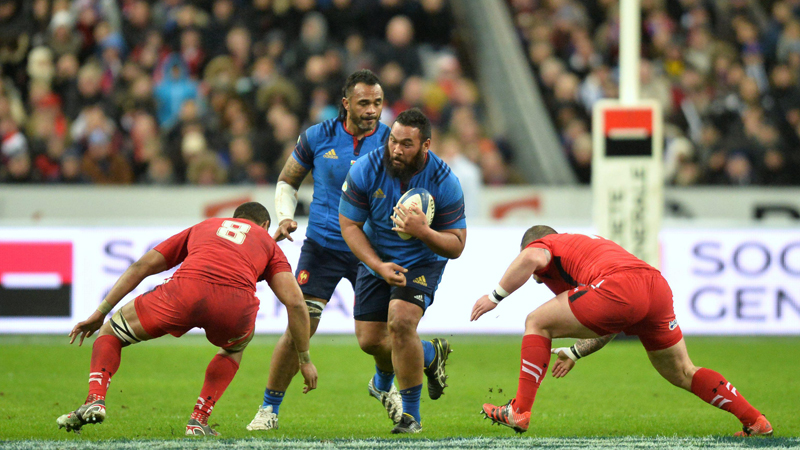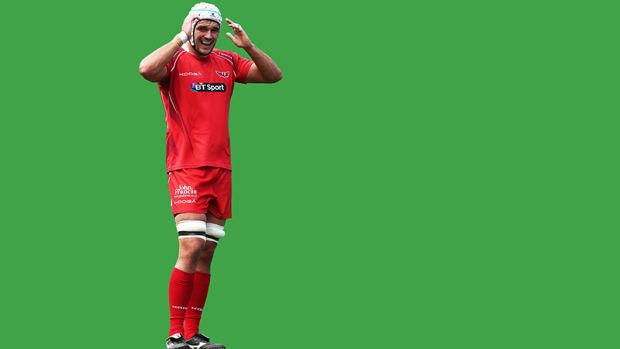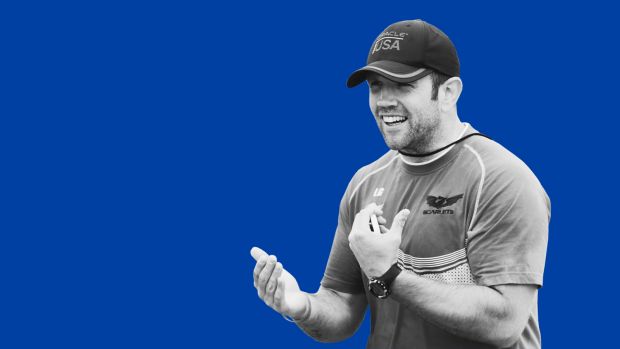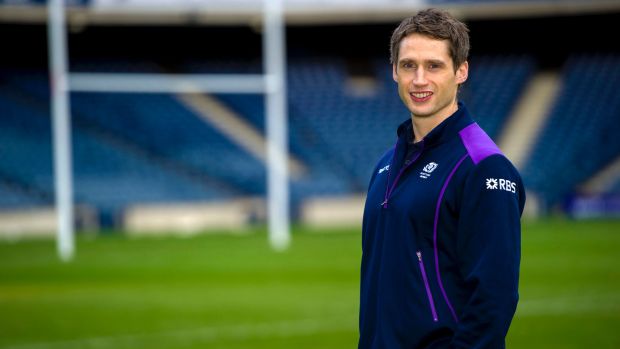Rugby: Where Big Men Go to Get Fit
Three pros discuss how rugby is the perfect place for the larger guy to train

The Rugby World Cup is a daily reminder that you don’t need to look like David Beckham to be as fit as a fiddle. Here, a player, a strength coach and a dietician tell Coach Magazine there are plenty of opportunities to be found in the rugby world if you’re carrying a little extra timber.
The Player: Tom Price
The 6ft 8in second-row forward has represented England in three age groups, and is currently making himself a key player for top Welsh side Scarlets

What was your appetite like as a kid?
I loved sweets and chocolate, but also ate well to keep healthy. I didn’t have a massive appetite until I started playing a lot of rugby during the week and weekends. Then I became very hungry indeed.
How hard do you have to work to keep yourself in prime condition?
I have to work hard to keep my weight up and also try to put more on. I haven’t got amazing genes where I grow straight away after eating a big meal, but it’s something I try to keep on top of. It’s easy to get out of shape, especially if you have time off or an injury. You want to relax as much as possible because your body is under such stress during the season, but it’s easy to miss meals and become lethargic if you don’t keep active.
What advice would you give to younger guys who see their size as a disadvantage?
Get the Coach Newsletter
Sign up for workout ideas, training advice, reviews of the latest gear and more.
When I was younger, I was tall for my age and had a lot of friends in rugby who were smaller than me. As long as you work hard to keep pushing yourself, working on your skills and nutrition, size shouldn’t come into it.
What advice would you give to the average “larger” guy who doesn’t think he’s physically capable of participating in any kind of competitive sport?
You don’t know if you don’t try. What have you got to lose? Everyone has to start somewhere. In competitive sport there’s a role for everyone, all shapes and sizes.
What sort of exercises have been most effective for you to build muscle or improve condition?
The most effective way to build muscle is by going to the gym regularly and working specific parts of the body. Instead of going to the gym and doing the whole body, cut it down and work on one or two components for longer. Adding high reps [with lighter weights, as opposed to low reps with heavier weights] to the gym programme has helped me, and shuttle runs have improved my conditioning. Conditioning can become repetitive if you’re going for a jog or running on a treadmill. Mix it up by involving light weights while doing circuits, or even hill sprints.
What advice have you found most helpful or inspirational?
You are in control of what you do. By remembering this and keeping it close, you will always be aware of all the hard work that you have done to reach where you are. Your future is in your hands.
Do you think people judge you unfairly as a big chap?
Not always, but my height does get commented on a lot. I always find myself helping people get items off the top shelf in supermarkets. What a liberty!
The Coach: Ian Gibbons
Strength and conditioning expert Gibbons has worked with Pro12 team Scarlets, Wales Rugby League and Premiership giants Saracens

What exactly does a strength and conditioning coach do?
We physically prepare the players for the demands of multiple games over the course of the season. Everything from weight training in the gym and additional power training, through to running and aerobic activities.
How different are professional rugby forwards from the average 110kg man in the street?
Rugby players are dedicated to training and eating properly. It takes a lot of discipline to maintain that lifestyle, and as a result their total body fat would be somewhere between 9-14%, whereas the average guy’s would be more than 20%.
What could the typical big guy learn from them?
I can’t stress how important nutrition is. You should eat the right things at the right times, and seek professional help from a nutritionist or personal trainer. Set achievable goals and see them through. A good tip is to write down what you eat and review it every day. That will keep you motivated.
Are there any exercises you do primarily with the bigger guys?
The forwards have a bigger strength base and do more endurance work. They generally avoid track work because it puts a ton of stress on their ankles and hips. They do more strongman-based stuff like the farmer’s walk and flipping tyres. There’s also a lot of wrestling and boxing as it’s all about manipulating the opponent’s bodyweight.
What advice would you give to heavier guys starting to get fit?
Prioritise and work on one area at a time. For example, start going to the gym two or three nights a week for a month, then look at your nutrition. Don’t try to do everything at once.
Are there any precautions they should take, or potential pitfalls?
Be sensible. If you’re 18 stone and have never run before, don’t try to run ten miles because you’ll never run again. Start slowly and progress.
What have been the biggest changes that you’ve seen in recent years in terms of getting big men in shape and avoiding injury?
The use and application of sports science has become commonplace now. We can use GPS and heart rate monitors to break down every aspect of a player’s game.
Which of the larger international players would you say are most like an ordinary bloke, and which are truly exceptional?
You could point at any front-row forward and compare them to an average guy. They all like a bit of cake now and then. A truly exceptional athlete would be Sam Burgess, who has just broken into the England squad. He’s a freak of nature.
The Dietician: Richard Chessor
The lead nutritionist for the Scottish Rugby Union has also worked for the British Olympic boxing and judo squads

What does a rugby nutritionist do?
The nutritionist’s role will vary between teams, but generally they will be responsible for all aspects of food, fluid and supplementation, and in supporting each player to reach their individual performance goals.
What’s the key to feeding a professional rugby team?
Quality and timing are two of our key principles – getting the players to eat the right foods at the right times. We focus on minimising processed foods and consuming a wide range of fresh and seasonal produce.
Is it true some players burn more calories than they consume?
Very much so. During certain periods of the season if the training and/or game load is high, some players can struggle to consume enough calories to match their energy expenditure. We can also intentionally create this situation in order to manage body weight.
How can they maintain their mass and health over the course of a season or a tournament?
Body mass will fluctuate depending on the phase of the season and training demands. Professional players are used to a regular training routine, and if this is disrupted due to injury, or when the focus shifts, it can be difficult for players to maintain their body mass and composition. In these situations, we work with the players to help them match their energy intake to their expenditure and ensure their protein intake is high enough to prevent/limit protein loss. The players will also supplement with multivitamins, probiotics and fish oils.
What sort of mistakes do the less experienced players make?
Younger players tend to have a greater reliance on heavily processed foods such as takeaways, sugary drinks and ready meals. Often this is the result of limited cooking and shopping abilities, so we work to develop their practical skills as well as their nutrition knowledge.
Are you ever surprised by the amounts of food they consume?
I’ve seen 17-year-olds eat more than 30-year-olds who are twice their size. It’s usually the second-row players that have the biggest appetites. Men weighing 120-130kg need a lot of food.
What’s the difference between the nutrition required by these guys and the rest of us?
Normal men would struggle to match the energy expenditure of big players in training, so energy and carbohydrate needs will be reduced. Secondly, protein requirement will be lower.
Do big guys face a different set of nutritional challenges?
Because big guys have a higher energy requirement, they tend to eat bigger portions. This isn’t usually a problem until there’s a decrease in energy expenditure and they struggle to reduce their portion sizes.
What nutritional advice would you give to a big chap who wanted to lose a bit of timber?
Address the quality of what they eat and when they eat it. Keep bigger meals closer to exercise, and reduce the intake at rest.
Do you have any “shortcuts” to get weight off players after injury?
Control of your food environment is incredibly important. That means surrounding yourself with the foods that you should be eating and avoiding the foods that you shouldn’t.
For more like this, check out Coach magazine. For info on how to find your free copy, click here
Coach is a health and fitness title. This byline is used for posting sponsored content, book extracts and the like. It is also used as a placeholder for articles published a long time ago when the original author is unclear. You can find out more about this publication and find the contact details of the editorial team on the About Us page.

